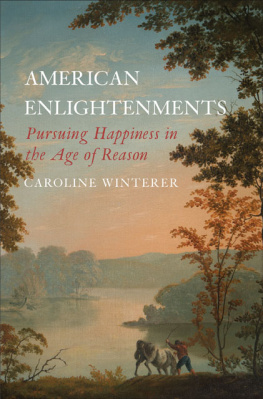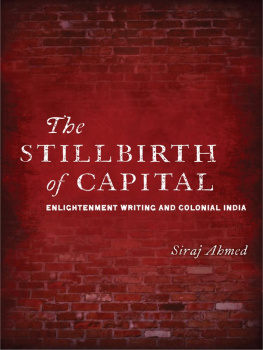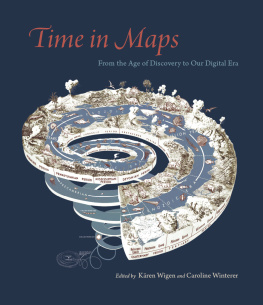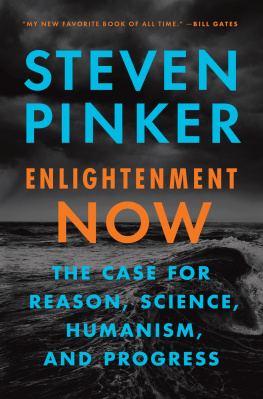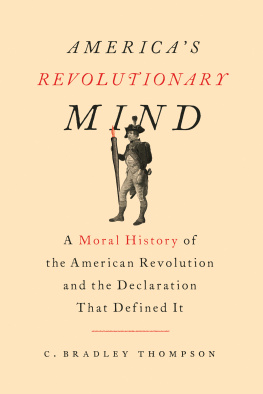Winterer - American enlightenments: pursuing happiness in the age of reason
Here you can read online Winterer - American enlightenments: pursuing happiness in the age of reason full text of the book (entire story) in english for free. Download pdf and epub, get meaning, cover and reviews about this ebook. City: United States, year: 2018, publisher: Yale University Press, genre: Politics. Description of the work, (preface) as well as reviews are available. Best literature library LitArk.com created for fans of good reading and offers a wide selection of genres:
Romance novel
Science fiction
Adventure
Detective
Science
History
Home and family
Prose
Art
Politics
Computer
Non-fiction
Religion
Business
Children
Humor
Choose a favorite category and find really read worthwhile books. Enjoy immersion in the world of imagination, feel the emotions of the characters or learn something new for yourself, make an fascinating discovery.
American enlightenments: pursuing happiness in the age of reason: summary, description and annotation
We offer to read an annotation, description, summary or preface (depends on what the author of the book "American enlightenments: pursuing happiness in the age of reason" wrote himself). If you haven't found the necessary information about the book — write in the comments, we will try to find it.
Winterer: author's other books
Who wrote American enlightenments: pursuing happiness in the age of reason? Find out the surname, the name of the author of the book and a list of all author's works by series.
American enlightenments: pursuing happiness in the age of reason — read online for free the complete book (whole text) full work
Below is the text of the book, divided by pages. System saving the place of the last page read, allows you to conveniently read the book "American enlightenments: pursuing happiness in the age of reason" online for free, without having to search again every time where you left off. Put a bookmark, and you can go to the page where you finished reading at any time.
Font size:
Interval:
Bookmark:
AMERICAN ENLIGHTENMENTS
The Lewis Walpole Series in Eighteenth-Century Culture and History
The Lewis Walpole Series, published by Yale University Press with the aid of the Annie Burr Lewis Fund, is dedicated to the culture and history of the long eighteenth century (from the Glorious Revolution to the accession of Queen Victoria). It welcomes work in a variety of fields, including literature and history, the visual arts, political philosophy, music, legal history, and the history of science. In addition to original scholarly work, the series publishes new editions and translations of writing from the period, as well as reprints of major books that are currently unavailable. Though the majority of books in the series will probably concentrate on Great Britain and the Continent, the range of our geographical interests is as wide as Horace Walpoles.

Published with assistance from the Annie Burr Lewis Fund.
Published with assistance from the foundation established in memory of Calvin Chapin of the Class of 1788, Yale College.
Copyright 2016 by Yale University.
All rights reserved.
This book may not be reproduced, in whole or in part, including illustrations, in any form (beyond that copying permitted by Sections 107 and 108 of the U.S. Copyright Law and except by reviewers for the public press), without written permission from the publishers.
Yale University Press books may be purchased in quantity for educational, business, or promotional use. For information, please e-mail (U.K. office).
Set in Janson type by IDS Infotech Ltd., Chandigarh, India.
Printed in the United States of America.
Library of Congress Control Number: 2016937262
ISBN 978-0-300-19257-5 (hardcover: alk. paper)
A catalogue record for this book is available from the British Library.
This paper meets the requirements of ANSI/NISO Z39.48-1992 (Permanence of Paper).
10 9 8 7 6 5 4 3 2 1
For Kurt, Julia, and Nicholas
with love
Contents
Acknowledgments
I T IS A PLEASURE to thank the many friends and colleagues who gave their time and energy over the years as I worked on this book.
I owe an enormous debt of gratitude to Mark Peterson and James Turner. Both read and made extensive comments on each chapter as I finished it. Their suggestions have improved the book immeasurably. Thanks to Jennifer Ratner-Rosenhagen, Daniel Rodgers, Mark Peterson, and Jonathan Gienapp for reading the whole manuscript and then participating in a three-hour seminar at Stanford University in September 2015 dedicated to analyzing the books central claims and improving the argument. All entered cheerfully into the spirit of what I was trying to do and gave me many superb suggestions for revision.
A number of other colleagues commented on individual chapters or in some way entered substantively into the conceptual architecture of the book. Many thanks to Keith Baker, Mary Elizabeth Berry, Jennifer Burns, Leslie Butler, Giovanna Ceserani, Francis Cogliano, John Dixon, Dan Edelstein, Paula Findlen, Estelle Freedman, Nils Gilman, David Hollinger, Sarah Igo, Joel Isaac, James Kloppenberg, Christopher Krebs, Emily Levine, Suzanne Marchand, Carol McKibben, the late Michael OBrien, Jessica Riskin, Daniel Rosenberg, Dorothy Ross, James Sheehan, David Grant Smith, Amy Dru Stanley, Richard White, and Kren Wigen. Two of the anonymous readers for Yale University Press provided extremely helpful suggestions for revision. I thank my editor at Yale, Steve Wasserman, for ably shepherding the manuscript through its final stages. Susan Laity of Yale copyedited the manuscript with magnificent skill and sound judgment.
Over the years I have presented aspects of this book in various settings, and I thank the many participants who improved the manuscript with their ideas and suggestions: the Department of History at the University of California, Berkeley; the Representing Time workshop at the Stanford Humanities Center; the Futures of Atlantic Intellectual History conference at Harvard University; the Republic of Letters in North America conference at the Huntington Library; the Let There Be Enlightenment conference at Stanford University; the Department of History at Stanford; the Bay Area Seminar in Early American History and Culture; and the Humanities Center at the University of Rochester.
Colleagues at the Stanford University Library are a constant source of help on research matters large and small. I am especially grateful to Becky Fischbach, John Mustain, and Benjamin Stone for their expertise and kindness over the years. Scott Spillman, who is completing his dissertation in the Department of History at Stanford, secured the illustrations and permissions; I thank him for going about these tasks with his usual superhuman efficiency and competence. My wonderful colleagues at the Stanford Humanities Center make coming to work each day a pleasure. Special thanks to Susan Sebbard for daily doses of good cheer.
Barrett Moore and Sherril Green listened to my various ideas on long hikes among the redwoods and banana slugs of the Santa Cruz mountains; they are partially responsible for maintaining my optimism and sanity as I directed a large research institute and wrote a book. My family is an endless source of encouragement. I especially thank my parents, Jacqueline Mammerickx Winterer and Edward L. Winterer; my sister, Juliette Winterer; and my nieces, Amelia and Linnea Wright. My love for the three delightful people who lived with this book and its author every day is reflected on the dedication page.
Introduction: American Enlightenments
D URING THE SECOND HALF of the eighteenth century, some of the most articulate and reflective inhabitants of British America began to think of themselves as enlightened and of their era as an enlightened age. To these people, becoming enlightened meant using reason and empirical data as their guides rather than inherited tradition or biblical revelation. Yearning for a day when humanity would be happier than it was now or had ever been in the past, they hoped that through sheer human effort tomorrows sun would rise over a more just, prosperous, and peaceful earth. They now turned to an array of long-standing interestsin nature, history, population, farming, society, religion, political economy, and governmentand set about trying to approach them in ways they called enlightened. To be enlightened was to be filled with hope. This book is about those hopeful people in British America and what became the new United States.
Today, we do not necessarily agree that these self-anointed enlightened people made the world a better place. We wonder how they dared call themselves enlightened when they left so much misery and injustice in the world, and when some of the projects they put into motion appear to us to have yielded such ambiguous or even tragic results. We consider them hypocritical, pompous, or self-deluded because they did not deliver on their promises. But our duty to the past is not to judge it; our duty is to understand it. In this book I neither celebrate nor condemn these first prophets of tomorrow. Instead, I reconstruct the world as they saw it, showing how enlightenment was felt, perceived, and lived during the moment when the idea first captured the imaginations of a motley group of people living on the fringes of the British Empire, people who communicated intensively and feverishly with interested others scattered across the Americas and Europe.
Nowhere was enlightenment a formal political program, nor were the enlightened a sharply defined group. Rather, enlightenment was a process of becoming, a way of imagining the relationship of the present to the past. According to people who imagined themselves to be enlightened, the present should be better than the past and the future better than the present. They now routinely began to say that they lived in an enlightened age, in which the light of reason and science would free humanity from the darkness of the Middle Ages, when popes and kings had shackled humanity to ignorance and bigotry. Around Europe, in many languages, others found similar terms to describe the sense that a new dawn was breaking, filling the world with the light that would show humankind the way forward to a happier future. The enlightened age formed the pinnacle of a homogeneous chronology of historical time stretching from the very deepest human antiquity to the present. This secular, historical time became the new framework in which human society and action were contained and understood. Other chronologies, such as the cosmic eternity described in the Bible, now receded in importance without ever being entirely displaced. People who thought themselves enlightened were acutely self-conscious of their era and their own self-imposed duty to promote the improvement of future ages. What good was the enlightenment of the eighteenth century, asked J. Hector St. Jean de Crvecoeur in his salute to the American potato, if it did not help us see and adopt everything the genius of man had invented for the happiness of humanity?
Next pageFont size:
Interval:
Bookmark:
Similar books «American enlightenments: pursuing happiness in the age of reason»
Look at similar books to American enlightenments: pursuing happiness in the age of reason. We have selected literature similar in name and meaning in the hope of providing readers with more options to find new, interesting, not yet read works.
Discussion, reviews of the book American enlightenments: pursuing happiness in the age of reason and just readers' own opinions. Leave your comments, write what you think about the work, its meaning or the main characters. Specify what exactly you liked and what you didn't like, and why you think so.

